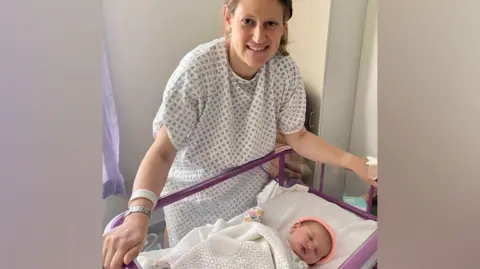### Government Must Expedite Maternity Care Reforms
Former Conservative MP Theo Clarke has strongly criticized the government for its lack of progress on enhancing maternity care within the United Kingdom, particularly highlighting issues affecting England and Wales. This concern emerged from her personal experience during childbirth, which has driven her to campaign vigorously for improvements in maternity services and care standards.
#### A Harrowing Experience
Back in 2022, Clarke underwent an extremely traumatic birthing experience at the Royal Stoke University Hospital, which culminated in a 40-hour labor and necessitated emergency surgery due to severe blood loss. This experience prompted her to take the issue public, giving an emotional speech in Parliament in 2023 that showcased the inadequacies in the current maternity care system. In the wake of her personal ordeal, she also chaired an All Party Parliamentary Group (APPG) which proposed recommendations aimed at overhauling the maternity care framework.
Recently, Clarke launched a memoir titled “Breaking The Taboo – Why We Need to Talk About Birth Trauma,” aimed at helping other women navigate similar traumatic experiences and advocating for necessary changes in the healthcare system. In an interview regarding her book, Clarke expressed her commitment to continue her advocacy work post-politics, stating, “The government appears to have been under the misapprehension that I would disappear when I lost my seat – that is not going to happen.”
#### Call for Implementation of Recommendations
During her launch event, Clarke called upon the government to implement the cross-party recommendations stemming from the birth trauma inquiry, which outlined a substantial need for reform within maternity and postnatal services. She pointedly remarked, “The government has been in power now for 10 months and we’ve had no major announcements on maternity.” This inquiry, published in May 2024 after gathering testimonies from over 1,300 women who faced traumatic births, reinforced the necessity for fundamental changes to healthcare practices that impact women’s health significantly.
Clarke emphasized that there remains considerable work to be done towards improving maternity care across the UK. She cited a pervasive sense of stigma surrounding conversations about women’s health issues and noted that these topics rarely receive adequate parliamentary discussion. As she stated, sharing her own story was meant to foster a broader dialogue and raise awareness of the challenges many women encounter during childbirth.
#### Insufficient Progress Made
Clarke’s concerns were echoed by senior midwife Donna Ockenden, who attended the book launch. Ockenden, known for her independent review regarding the Shrewsbury and Telford Hospital NHS Trust, communicated that despite previous agreements to enact her recommendations, significant changes have yet to be realized. She remarked, “Three years ago the then Secretary of State Sajid Javid agreed to implement my recommendations, but in the intervening years not enough has happened.”
The issue of funding also emerged as a critical factor in improving maternity services. Reports indicated that out of the £100 million designated for maternity improvements following previous inquiries, a mere £2 million was allocated for actual service enhancements this year. In response, the Department of Health acknowledged that progress was being made but faced scrutiny for perceived inaction.
#### Continued Advocacy
Despite the challenges, Clarke remains optimistic about the importance of her campaign. Alongside her memoir, she has initiated a podcast series focusing on birth trauma, featuring interviews with other women who have shared their experiences. One such woman, Molly Hunter, contributed to the book by sharing her own encounters with miscarriages. Hunter highlighted the isolation that often accompanies such experiences, emphasizing the need for greater conversation surrounding maternal health issues.
In conclusion, while the government recognizes that there is more work ahead, the consensus from advocates like Clarke and Ockenden is that immediate action is necessary to reform women’s healthcare effectively. Clarke concluded firmly, “The campaign is not over, and I am very unhappy that they have not adopted all of our recommendations,” underscoring her unwavering commitment to pushing for changes that will create a more compassionate and effective maternity care system for all women.



